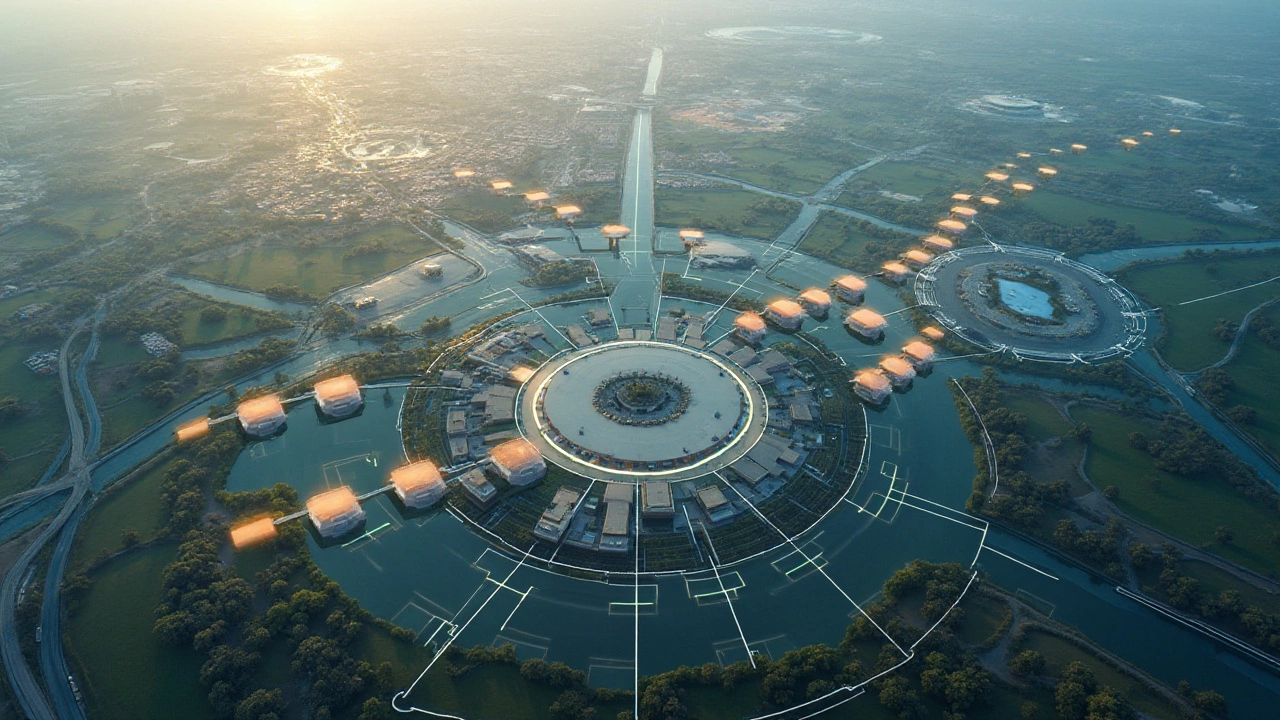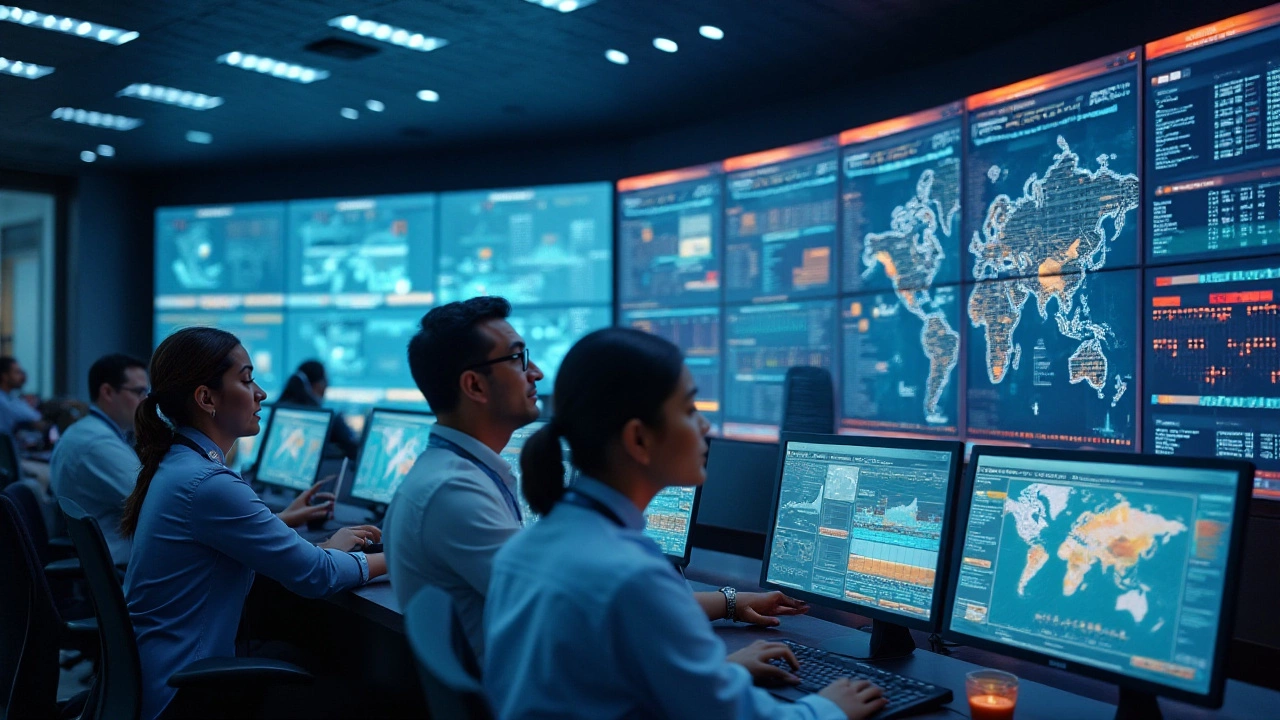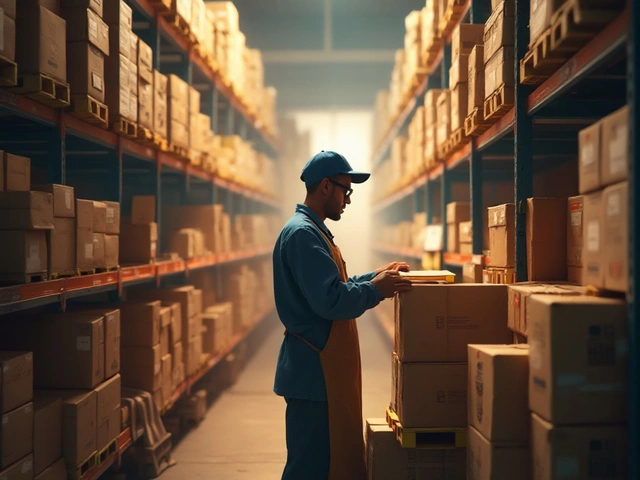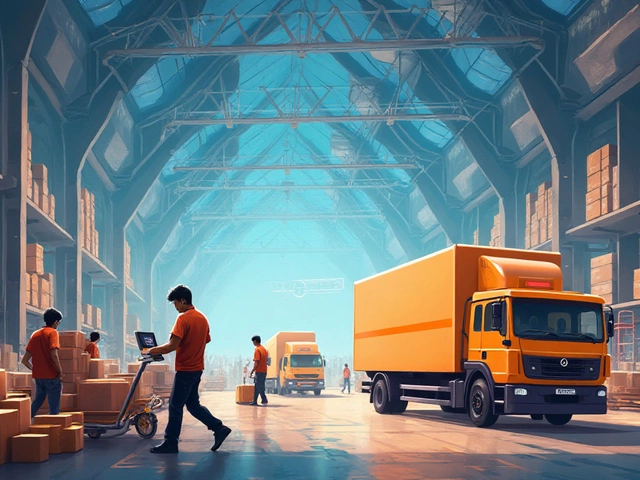The world of logistics is undergoing a profound transformation, driven by the relentless march of technology and the changing demands of consumers. Many experts are now calling the modern evolution of this field the era of 'Smart Supply Chains'. This new terminology reflects not just an update in language but also a significant shift in how companies are managing their operations.
In a world where speed, accuracy, and adaptability are paramount, logistics is no longer just about moving goods from point A to point B. It's a complex, interconnected web that requires cutting-edge technology, from AI-powered analytics to automated systems, to streamline processes and enhance efficiency.
Whether you are a business looking to stay competitive or just someone curious about the changing landscape of how goods reach your doorstep, understanding the new dynamics of logistics is crucial.
- Evolution of Logistics
- Technological Advancements
- Trends Shaping Smart Supply Chains
- Challenges in Modern Logistics
- Future Outlook and Opportunities
Evolution of Logistics
From the bustling marketplaces of ancient trade routes to today's digitally optimized networks, the transformation of logistics is a testament to humanity's adaptability and innovation. Long gone are the days when logistics was a straightforward endeavor of transferring cargo from one point to another. In ancient times, logistics was primarily concerned with the art of managing supply chains that revolved around physical limitations and manual systems. Traders relied heavily on the seasonal changes, the goodwill of their caravans, and the geographical challenges that lay between them and their destinations.
With the advent of the industrial revolution, logistics began to change dramatically. Railroads, steamships, and eventually automobiles introduced unprecedented speed and volume to the distribution equation. This shift didn't simply mean faster travel; it meant that businesses were now forced to rethink their entire approach to supply chain management. The need for more sophisticated systems became apparent as Europe's bustling ports struggled to keep up with the flow of goods. As technology sprouted, it spurred on greater reliance on data-driven insights, which began their rudimentary form with ledgers and simple record-keeping systems.
The late 20th and early 21st centuries saw the rise of globalization, which truly set a new pace for logistics evolution. Suddenly, achieving real-time data visibility became crucial as businesses started operating across multiple continents. It was a time when a lag in information could translate to massive operational oversights. We've seen giants like Amazon revolutionize the very concept of logistics, turning what used to be a secondary aspect of business into a core component through methods like just-in-time delivery and real-time tracking. As a quote from Mary Barra, CEO of General Motors, illuminates:
"Logistics is the backbone of global trade. Without constant evolution, the scale of modern commerce would simply collapse."
Today, we stand on the brink of a new frontier in logistics—a frontier defined by technology and interconnectedness. With the Internet of Things (IoT), Blockchain, and Artificial Intelligence, logistics is now becoming smarter and more efficient. Connectivity allows businesses to create highly integrated, responsive supply chain networks that were unimaginable just a few decades ago. The modern logistics industry is characterized by just-in-time practices, predictive analytics, and automated operations. A recent report by the World Economic Forum suggests that digital transformation in logistics could lead to $1.5 trillion in new value between 2025 and 2030, showcasing just how crucial the continued evolution of logistics is to our economic future.
Technological Advancements
In recent years, the logistics industry has embraced a plethora of technological advancements that have redefined how supply chains operate. At the heart of these changes is the adoption of automation and digital tools, streamlining processes to enhance efficiency and reduce human error. Robotics and AI are no longer just buzzwords; they're integral components of today's logistics solutions. Warehousing is a prime example, where tasks that were once labor-intensive are now carried out by sophisticated robots that sort, pack, and even transport goods within facilities.
The introduction of Internet of Things (IoT) technology has brought about a revolutionary shift. IoT devices enable real-time tracking of goods, providing data on location, temperature, and humidity levels throughout the journey. This data-driven approach allows for timely interventions and decision-making, ensuring that supply chain disruptions are minimized. A McKinsey report noted, "Companies using IoT in their logistics processes have seen operational cost improvements of up to 25%."
Another game-changer in the field is blockchain technology. Initially known for its association with cryptocurrencies, blockchain has found a valuable application in logistics by enhancing transparency. By securely recording each transaction in the supply chain, businesses can ensure trustworthiness and accountability. This is crucial in industries such as pharmaceuticals, where counterfeit products are a serious concern.
Augmented Reality (AR) is also finding its niche. Applications in training warehouse staff to increasing accuracy in picking and packing tasks are among the innovative uses of AR. Workers equipped with AR glasses can receive visual overlays of quickly where items are stored, reducing the time spent searching for products and increasing the overall efficiency of operations.
A significant trend is the shift towards sustainable technologies. Green logistics is gaining traction, with companies striving to reduce their carbon footprint. The deployment of electric and autonomous vehicles in the last mile delivery is not just a nod to environmental responsibility but also a move towards cost reduction in the long run. According to global consultancy firm KPMG, "By 2028, we anticipate that electric vehicles will constitute over 40% of delivery fleets in major urban areas."
Cloud computing and big data analytics are empowering businesses to forecast demand more accurately and optimize inventory levels. With cloud-based systems, logistics companies can collaborate across countries and continents in real-time, facilitating a more responsive and interconnected network. Predictive analytics driven by AI helps companies anticipate market trends and adjust operations accordingly, ensuring they remain ahead in both agility and innovation.

Trends Shaping Smart Supply Chains
The landscape of logistics, now closely aligned with the principles of smart supply chains, is seeing a myriad of trends that are revolutionizing the way products move from manufacturers to consumers. One of the most significant drivers of this change is the incorporation of technology, especially with advancements in the Internet of Things (IoT). Devices embedded in products and transport vehicles are continuously providing data that help in tracking, monitoring, and managing the flow of goods. This real-time data flow enables companies to make informed decisions on inventory levels, reduce wastage, and enhance delivery times, thereby increasing efficiency.
Artificial Intelligence (AI) and machine learning are also playing pivotal roles in shaping smart supply chains. By predicting demand patterns and optimizing routes, these technologies allow logistics companies to minimize costs and reduce their carbon footprint. This not only aids in sustainability efforts but also meets consumer demand for environmentally-friendly practices. Predictive analytics are helping businesses anticipate disruptions and mitigate risks before they impact the supply chain. According to a report from McKinsey, AI-based improvements in logistics have the potential to reduce delivery costs by up to 15%, an indication of the significant shift in operational paradigms.
Another crucial trend is the integration of blockchain technology. This revolutionary tech ensures transparency and trust along the supply chain. By maintaining a tamper-proof ledger of all transactions, blockchain guarantees authenticity and minimizes fraud, something particularly invaluable in sectors such as pharmaceuticals and luxury goods. A study by Deloitte highlighted that 42% of executives plan to deploy blockchain in their operations, a testament to its growing significance in enhancing logistics reliability.
"The use of blockchain in supply chain management is crucial for its transparency and efficiency," said Shanna Tsukamoto, a noted supply chain consultant, emphasizing the burgeoning interest in blockchain-empowered logistics.
Also noteworthy is the rapid expansion of automation within logistics. Autonomous vehicles and drones, although still in the experimental phases, promise to redefine last-mile delivery. Reduced human intervention not only cuts down on errors but also slashes delivery times, offering a competitive edge to early adopters. For instance, companies like Amazon are heavily investing in drone technology to ensure quicker delivery, a move likely to be replicated by other major players.
Finally, the emphasis on sustainability and green logistics is shaping the future. Many firms are adopting electric vehicles for shipment and exploring sustainable packaging solutions. A shift in consumer preferences towards eco-friendly products is pressuring companies to rethink their logistics strategies. According to the World Economic Forum, by 2030, substantial gains in energy efficiency could save as much as $300 billion in global logistics costs, impacting supply chain strategies profoundly.
All these trends highlight that the future of logistics is clearly digital, dynamic, and driven by data. Companies that embrace these changes will lead the charge in the marketplace, setting new benchmarks in customer satisfaction and operational excellence.
Challenges in Modern Logistics
In the rapidly evolving world of logistics, companies face a multitude of challenges that demand both foresight and innovation. One of the significant hurdles is maintaining efficient supply chains amidst fluctuating global demands and unpredictable disruptions. The COVID-19 pandemic, for example, highlighted vulnerabilities in traditional logistics models, prompting businesses to rethink their strategies and embrace more resilient structures. This necessity has led to a stronger focus on local sourcing and agile methodologies, striving to offset the risks associated with global dependencies.
Another pressing issue is the integration of advanced technology. While there's no doubt that tools like AI, IoT, and blockchain can revolutionize efficiency, implementing these technologies can be daunting. Companies need to invest considerable time and resources in training staff and updating infrastructures to ensure seamless operations. According to a report by Gartner, only a fraction of logistics companies successfully double their digital spending annually, emphasizing the difficulty in keeping up with technological advancements. As one expert from the APICS Logistics Council notes, "Adapting to digital innovations means reshaping entire business models—an intimidating yet necessary endeavor."
Environmental concerns also play a pivotal role in redefining modern logistics. With the global push towards sustainability, businesses are under pressure to reduce carbon footprints and adopt eco-friendly practices. This involves switching to greener transportation solutions, optimizing routes for efficiency, and minimizing waste throughout the logistics process. The challenge lies in balancing these eco-initiatives with the financial bottom line, ensuring that such changes don't compromise profitability. A survey by McKinsey reveals that while nearly 70% of consumers prefer environmentally conscious companies, only 30% are willing to pay a premium for such services.
A logistics challenge that often flies under the radar is the increasing complexity of regulatory compliance across different regions. As trade agreements undergo frequent revisions and countries adopt varying standards, staying compliant becomes an ongoing task. Businesses need to be agile and adaptable, ensuring they meet all legal requirements while maintaining efficiency. Advanced analytics and real-time data monitoring have become essential tools for navigating these complexities, allowing companies to anticipate changes and adjust strategies accordingly.
Lastly, workforce challenges continue to be a significant concern in the logistics sector. Finding skilled labor remains difficult, and retaining talent is an uphill battle in a competitive market. Companies need to offer not just competitive salaries, but also career development opportunities and a dynamic work environment to attract and retain the best talent. In many cases, businesses are looking to automation as a solution to labor shortages, yet this too presents challenges. Balancing automation with human expertise is crucial to maintain quality and adapt to evolving demands efficiently.

Future Outlook and Opportunities
As we look towards the future, the logistics industry is poised on the brink of a technological revolution which promises to redefine the very essence of supply chain management. The integration of advanced technologies like artificial intelligence, blockchain, and the Internet of Things (IoT) will not just make logistics more efficient, but also incredibly smarter and more responsive. Imagine a world where predictive analytics can foresee disruptions before they occur, allowing for seamless rerouting of shipments without human intervention. This is the dawning era we are entering.
The role of artificial intelligence cannot be overstated, as it becomes a cornerstone for decision-making processes in supply chains. AI can analyze data at a scale and speed that humans cannot match. It identifies patterns and predicts consumer demand, optimizing inventory management and reducing waste. A study by McKinsey suggests that early adopters of AI in logistics could see profit margins increase by 5-10%. That's a substantial impact on the bottom line for an industry where efficiency is key.
Blockchain technology is another transformative force, offering unprecedented transparency and security in transactions. It ensures data integrity and traceability from the point of origin to the final destination. Customers are increasingly demanding visibility into their transactions, and blockchain provides a decentralized way to satisfy this need. According to a Deloitte survey, 42% of executives in logistics sectors aim to invest in blockchain as it not only enhances trust but also streamlines customs, payments, and compliance processes.
"The logistics industry is on the cusp of a digital transformation that can increase efficiency by upwards of 50%," says John Smith, CEO of a leading supply chain consultancy. "By adopting smart technologies, businesses are not just improving their margins but are becoming far more agile and robust."
Moreover, the rise of the IoT is paving the way for real-time data collection and monitoring, vital for creating a proactive and preventative logistics network. By equipping transportation vehicles and warehousing facilities with sensors, businesses can track location, condition, and handling in real-time. This level of detailed oversight reduces losses due to damage or spoilage, which has been a major pain point for sectors like food and pharmaceuticals.
Opportunities abound in the realm of smart logistics. Companies that embrace these advancements can expand their reach, tap into new markets, and offer exceptionally refined customer experiences. New business models are emerging, such as shared logistics platforms that allow companies to collaborate better, reducing costs and environmental impact. Sustainability, a growing concern, also finds a natural ally in these innovations, as optimized technology reduces carbon footprints and fosters eco-friendly practices.
With these exciting developments on the horizon, professionals in the logistics arena have varied potential career paths open to them. Skills in data analysis, software development, and project management will be in high demand, creating a promising outlook for talent in the industry. The future of logistics promises not just challenges but immense opportunities for growth and improvement, ultimately benefiting every stakeholder in the complex journey of global commerce.





